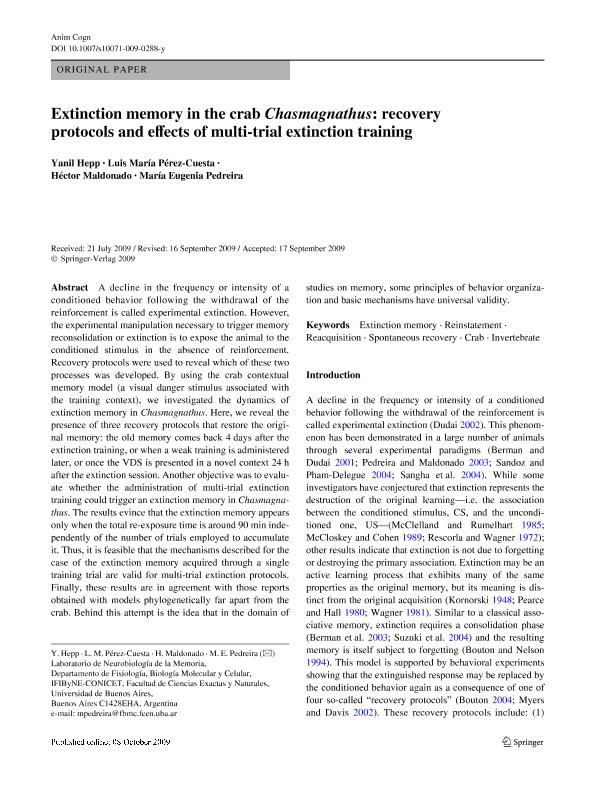Artículo
Extinction memory in the crab Chasmagnathus: recovery protocols and effects of multi-trial extinction training
Fecha de publicación:
10/2009
Editorial:
Springer-Verlag
Revista:
Animal Cognition
ISSN:
1435-9448
e-ISSN:
1435-9456
Idioma:
Inglés
Tipo de recurso:
Artículo publicado
Clasificación temática:
Resumen
A decline in the frequency or intensity of a conditioned behavior following the withdrawal of the reinforcement is called experimental extinction. However, the experimental manipulation necessary to trigger memory reconsolidation or extinction is to expose the animal to the conditioned stimulus in the absence of reinforcement. Recovery protocols were used to reveal which of these two processes was developed. By using the crab contextual memory model (a visual danger stimulus associated with the training context), we investigated the dynamics of extinction memory in Chasmagnathus. Here, we reveal the presence of three recovery protocols that restore the original memory: the old memory comes back 4 days after the extinction training, or when a weak training is administered later, or once the VDS is presented in a novel context 24 h after the extinction session. Another objective was to evaluate whether the administration of multi-trial extinction training could trigger an extinction memory in Chasmagnathus. The results evince that the extinction memory appears only when the total re-exposure time is around 90 min independently of the number of trials employed to accumulate it. Thus, it is feasible that the mechanisms described for the case of the extinction memory acquired through a single training trial are valid for multi-trial extinction protocols. Finally, these results are in agreement with those reports obtained with models phylogenetically far apart from the crab. Behind this attempt is the idea that in the domain of studies on memory, some principles of behavior organization and basic mechanisms have universal validity.
Palabras clave:
Extinction Memory
,
Crab
,
Invertebrate
Archivos asociados
Licencia
Identificadores
Colecciones
Articulos(IFIBYNE)
Articulos de INST.DE FISIOL., BIOL.MOLECULAR Y NEUROCIENCIAS
Articulos de INST.DE FISIOL., BIOL.MOLECULAR Y NEUROCIENCIAS
Citación
Hepp, Yanil; Pérez Cuesta, Luis María; Maldonado, Hector; Pedreira, Maria Eugenia; Extinction memory in the crab Chasmagnathus: recovery protocols and effects of multi-trial extinction training; Springer-Verlag; Animal Cognition; 13; 3; 10-2009; 391-403
Compartir
Altmétricas




